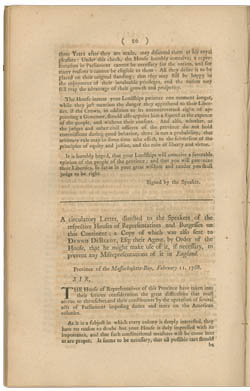What the Circular Letter of 1768 Signified
You may have noticed how in all these postings about the Massachusetts House’s Circular Letter of 1768, quoting politicians on the circular letter and on the debate over the circular letter, I’ve never actually quoted the circular letter.
That’s because the letter itself doesn’t strike me as particularly interesting or inciting. It went through the familiar argument that Parliament had no right to tax colonists because colonists couldn’t vote for Parliament. In February that position got the pithy formulation “No Taxation without Representation.”
The letter also complained about the new salaries that royal appointees were due to receive from the Townshend duties, asking whether “their having Salaries appointed for them by the Crown independent of the people hath not a Tendency to subvert the principles of equity.”
One fresh idea that the letter addressed was the notion of American colonists being represented in Parliament. Gov. Francis Bernard had floated that possibility privately in 1764, and later in 1768 a former governor, Thomas Pownall, would propose it in print. But the House ruled out the idea:
It’s possible that the first draft reported out of committee and voted down on 21 Jan 1768 was more confrontational in its language or proposals than the final text. Gov. Bernard reported that opponents of that draft argued that it “would be considered at home [i.e., in Britain] as appointing another congress” like the Stamp Act Congress of 1765. Which hadn’t actually accomplished much, but was seen as radical.
The only action the circular letter ended up proposing was that each colony’s legislature petition the Crown using the same arguments. As a result, the responses from other colonies to the Massachusetts House were positive but bland and pointed to no further action.
What turned the circular letter into the Circular Letter was the Earl of Hillsborough’s response to it in April. As a new Secretary of State, he wanted to strengthen the authority of the imperial government over the North American colonies. He interpreted Bernard’s reports on the Massachusetts legislature as even worse than they were. He didn’t think he could just ignore this document.
Once Hillsborough demanded that the Massachusetts House rescind the letter, however, he moved the argument beyond what would be a fair system of taxation in a worldwide empire. He turned the conflict into one over whether the Crown could compel some of its North American subjects into abjuring their established speech and principles.
TOMORROW: Time to vote.
That’s because the letter itself doesn’t strike me as particularly interesting or inciting. It went through the familiar argument that Parliament had no right to tax colonists because colonists couldn’t vote for Parliament. In February that position got the pithy formulation “No Taxation without Representation.”
The letter also complained about the new salaries that royal appointees were due to receive from the Townshend duties, asking whether “their having Salaries appointed for them by the Crown independent of the people hath not a Tendency to subvert the principles of equity.”
One fresh idea that the letter addressed was the notion of American colonists being represented in Parliament. Gov. Francis Bernard had floated that possibility privately in 1764, and later in 1768 a former governor, Thomas Pownall, would propose it in print. But the House ruled out the idea:
…considering the utter impracticability of their being fully & equally represented in Parliament, and the great Expence that must unavoidably attend even a partial Representation there; this House think that a Taxation of their Constituents even without their consent, grievous as it is would be preferable to any Representation that could be admitted for them there.The letter also made several nods to the Crown’s primacy, including calling the colonial assemblies “a Subordinate Legislative” and concluding by “expressing their firm Confidence in the King, our common Head and Father, that the united & dutiful supplications of his distressed American Subjects will meet with his Royal and favorable acceptance.”
It’s possible that the first draft reported out of committee and voted down on 21 Jan 1768 was more confrontational in its language or proposals than the final text. Gov. Bernard reported that opponents of that draft argued that it “would be considered at home [i.e., in Britain] as appointing another congress” like the Stamp Act Congress of 1765. Which hadn’t actually accomplished much, but was seen as radical.
The only action the circular letter ended up proposing was that each colony’s legislature petition the Crown using the same arguments. As a result, the responses from other colonies to the Massachusetts House were positive but bland and pointed to no further action.
What turned the circular letter into the Circular Letter was the Earl of Hillsborough’s response to it in April. As a new Secretary of State, he wanted to strengthen the authority of the imperial government over the North American colonies. He interpreted Bernard’s reports on the Massachusetts legislature as even worse than they were. He didn’t think he could just ignore this document.
Once Hillsborough demanded that the Massachusetts House rescind the letter, however, he moved the argument beyond what would be a fair system of taxation in a worldwide empire. He turned the conflict into one over whether the Crown could compel some of its North American subjects into abjuring their established speech and principles.
TOMORROW: Time to vote.


No comments:
Post a Comment